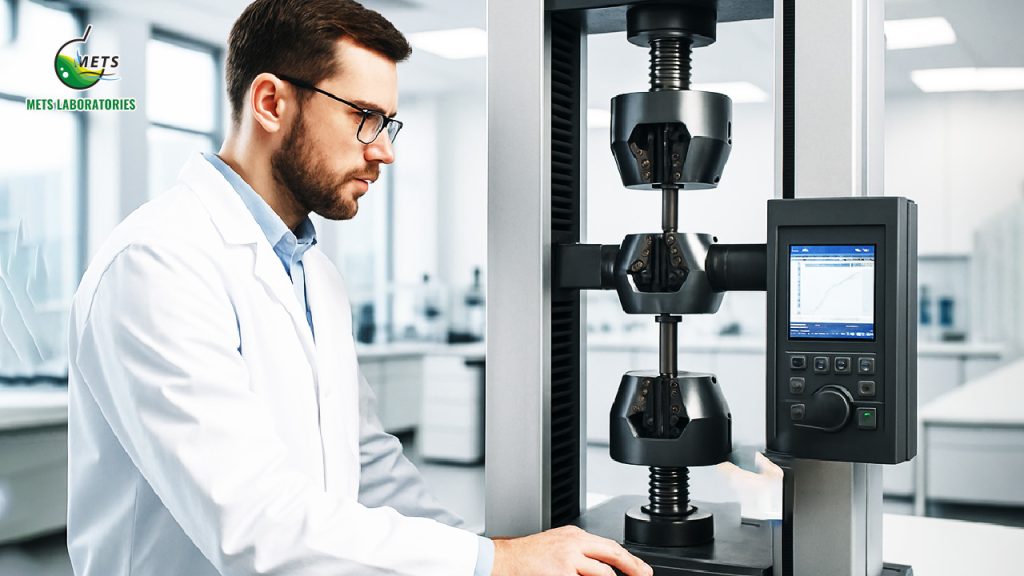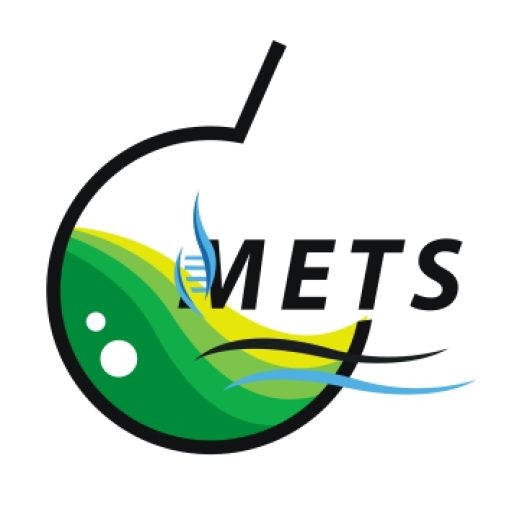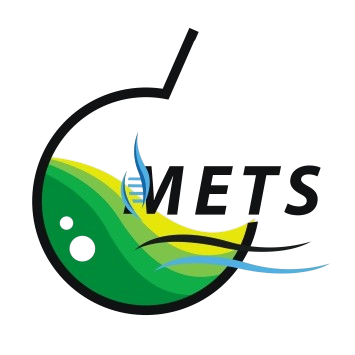
Mechanical / Physical Testing – METS Laboratories
Physical and mechanical testing encompasses a broad set of procedures used to evaluate the structural and functional properties of a material or product. While the two often overlap, they have distinct focuses:
- Physical Testing assesses properties that do not involve forces or mechanical load, such as density, porosity, moisture content, color, thermal conductivity, and dimensional accuracy.
- Mechanical Testing evaluates how a material responds to applied forces. It involves measurements of strength, hardness, elasticity, ductility, toughness, and fatigue resistance.
What Is Tensile Testing?
Tensile testing—also known as tension testing—is a destructive test method that measures how a material reacts to forces that attempt to stretch it. During the test, a specimen is pulled from both ends until it breaks. The goal is to determine the mechanical properties such as:
- Ultimate tensile strength (UTS)
- Yield strength
- Modulus of elasticity (Young’s modulus)
- Elongation
- Reduction of area
- Fracture characteristics
Importance of Tensile Testing
Tensile testing provides essential data that drives decisions in:
1. Material Selection
Before selecting a material for a specific application, it’s crucial to understand its tensile behavior. For example, a suspension bridge cable must have high tensile strength, while a rubber band requires high elongation.
2. Quality Control
Regular tensile tests during production help ensure materials remain consistent and meet required specifications.
3. Product Design and Safety
Understanding the tensile limits of materials helps engineers design products that won’t fail under stress, especially in safety-critical industries like aerospace and automotive.
4. Regulatory Compliance
Many industry standards (e.g., ASTM, ISO, EN) mandate tensile testing for certifications and market approvals.
Common Physical Tests
1. Density and Specific Gravity
These tests determine a material’s mass per unit volume. Consistency in density is essential in manufacturing, especially for polymers, foams, and composites.
2. Thermal Conductivity and Expansion
Materials often need to withstand temperature fluctuations. Measuring their ability to conduct heat or expand under temperature changes is crucial, especially in electronics and building materials.
3. Moisture Content and Absorption
High moisture content can weaken certain materials (e.g., wood, concrete, polymers). Physical testing detects these vulnerabilities early.
4. Dimensional Accuracy
Using tools like coordinate measuring machines (CMMs) or laser scanners, manufacturers can verify that products conform to design specifications.
5. Color and Gloss Measurement
In industries like packaging or automotive, aesthetics matter. Colorimeters and gloss meters ensure visual uniformity across production batches.
Common Mechanical Tests
1. Tensile Testing
This is one of the most widely used tests to determine a material’s strength. The sample is pulled apart until it breaks, providing data on yield strength, tensile strength, and elongation.
2. Compression Testing
This test evaluates how materials respond to compressive forces. It is vital for materials used in load-bearing applications, such as concrete blocks and packaging materials.
3. Hardness Testing
Hardness is a material’s resistance to deformation. Methods like Brinell, Rockwell, and Vickers are used depending on the material and application.
4. Impact Testing
Charpy and Izod tests determine a material’s ability to absorb energy during sudden impact, essential for safety-critical components.
5. Fatigue Testing
This measures how a material holds up under repeated loading and unloading cycles. Aircraft wings and automotive parts undergo such testing to simulate real-world stress.
6. Creep and Stress Rupture Testing
These are long-term tests where materials are exposed to constant stress at elevated temperatures. It’s especially critical for metals and polymers used in turbines, engines, and industrial machinery.
Construction
Concrete, steel, and composite materials used in buildings and infrastructure undergo compressive, tensile, and flexural testing to guarantee safety and durability.
Electronics
Physical testing ensures circuit boards and enclosures resist thermal cycling, shock, and vibration. Mechanical testing of solder joints and connectors ensures long-term reliability.
Medical Devices
Mechanical testing helps validate implants, prosthetics, and surgical tools under load-bearing or repeated use conditions, ensuring patient safety and device longevity.
Testing Standards and Accreditation
Accurate testing requires adherence to recognized standards. Common international standards bodies include:
- ASTM International (American Society for Testing and Materials)
- ISO (International Organization for Standardization)
- EN (European Norms)
- DIN (Deutsches Institut für Normung – German Institute for Standardization)
Many manufacturers work with third-party accredited labs (ISO/IEC 17025 compliant) to ensure unbiased, accurate results that meet regulatory or customer requirements.
Key Terms and Measurements
Understanding the tensile test results involves interpreting a few critical properties:
The maximum stress a material can withstand before breaking.
The point at which the material begins to deform plastically (i.e., won’t return to its original shape when the load is removed).
Also called Young’s Modulus, it measures the material’s stiffness, calculated from the slope of the linear portion of the stress-strain curve.
The percentage increase in length before fracture—a measure of ductility.
The percentage decrease in cross-sectional area at the point of fracture, indicating material toughness.
What METS Laboratories Offers?
NABL accredited, METS LABORTORIES INDIA PVT.LTD can test to a variety of the established methods (e.g., ISO, ASTMD, AOAC, APHA, FSSAI, BIS,)
- Our laboratory conducts testing on a wide range of products, materials, and components to verify compliance with standards, specifications, and regulatory requirements. Our team is happy to provide expert advice and guidance to ensure the appropriate water testing is carried out for your needs.
- Our dedicated, experienced, and friendly team is here to help—providing expert knowledge, guidance, and access to cutting-edge water testing capabilities and technologies in our laboratory.
- We conduct comprehensive product evaluations for appearance, quality, and performance. Our technical support network provides expert guidance—answering questions, interpreting results, and assisting with quality assurance program management.
- We participate in inter-laboratory proficiency testing and comparative analyses to ensure accuracy, reliability, and compliance with industry standards.
- We implement and maintain rigorous ISO/IEC 17025:2017 accreditation, ensuring internationally recognized standards for testing competence, measurement accuracy, and operational excellence in every analysis.
- We maintain strict customer confidentiality by treating all data as proprietary information.
- AccreditedISO/IEC 17025:2017 compliant services
- End-to-end environmental monitoring and sampling
- Customized test plans for industry, agriculture, urban planning, and residential safety
- Advanced instrumentation: GC-MS, ICP-OES, AAS, HPLC, FTIR, etc.
- On-site sampling by trained professionals
- Digital reports with compliance interpretation
- Emergency testing and quick-turnaround options
Beyond numbers, we offer peace of mind by delivering science you can trust and reports you can act on.
What We Ensure?
- Data Integrity: Every result is generated and verified under strict quality assurance.
- Compliance: All tests conform to the latest regulatory and industry-specific guidelines.
- Transparency: Clear, easy-to-understand reports and consultation support.
- Confidentiality: Your data remains secure, private, and protected.
- Environmental Stewardship: Our labs follow eco-friendly practices and aim to minimize testing-related waste and emissions.
Who It’s For?
- Industrial Facilities: To monitor effluents, emissions, and workplace safety
- Construction and Real Estate: For soil contamination, water logging, and indoor air quality
- Municipal Corporations: To assess urban air and water quality
- Schools, Hospitals & Hotels: For ensuring safe indoor environments
- Agricultural Communities: To test irrigation water and soil health
- NGOs & Research Institutions: For pollution studies and policy advocacy
- Citizens & RWAs: For local monitoring and complaint-based testing
Protect Consumers. Satisfy Authorities. Boost Market Confidence.
In today’s sustainability-driven world, businesses are held accountable by customers, investors, and regulators alike. METS Laboratories empowers you to:
• Protect your workforce and surrounding communities
• Achieve compliance with CPCB, SPCB, MoEF&CC, WHO, and ISO standards
• Build a reputation as an environmentally responsible brand
• Avoid costly penalties and legal action due to non-compliance
• Earn stakeholder trust with verified environmental claims and ESG reporting
Environmental testing isn’t just a legal formality—it’s a strategic asset.
Frequently Asked Questions
How do I book a test?
You can contact METS Laboratories via phone, email, or our website to schedule sampling or drop off a sample at our facility.
Is your lab accredited?
Yes, METS Laboratories is accredited under ISO/IEC 17025:2017.
How long does it take to get results?
Turnaround time depends on the parameters, but standard reports are typically delivered within 3–7 working days.
Do you provide on-site sampling?
Yes, we have trained field teams who follow strict SOPs for on-site sample collection.
Can I get help understanding the report?
Absolutely. We offer report interpretation and guidance on corrective actions or next steps.
What locations do you serve?
We serve clients across India and can coordinate with international partners when required.
Can you help with regulatory approvals?
Yes, our test reports are accepted by government authorities, and we can assist in documentation for environmental clearances.





